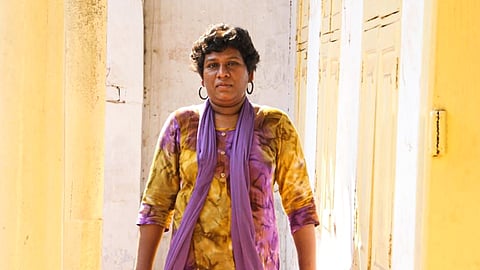

Delhi is often described as one of the most dangerous cities in India for women. Yet for lawyer and activist Bindhu Ammini, it is here that she has found refuge.
Life had become impossible in her home state of Kerala.
In October 2018, the Supreme Court of India overturned a centuries-old ban that barred women of menstruating age from entering the Sabarimala Sree Dharma Sastha temple in Kerala. Post the verdict, Bindhu became one of the first women to set foot in the hill shrine — an act that altered the course of her life.
Though the state government announced protection for women who entered the temple fearing backlash from right-wing groups who opposed the verdict, in reality, the women were left to fend for themselves. In the months after her climb, Bindhu was assaulted several times, run over by an auto once, and subjected to relentless online abuse.
“At least the right-wing is openly violent,” she said, “but it is the Left government in Kerala that silently stabbed me.”
Earlier this month, we met Bindhu at her small office in Delhi’s Mayur Vihar, where she has been living for over two years. She keeps her hair short. “People often circulate fake porn videos of me. To disassociate from them, I cut my hair and now it’s become this short,” she said. “I like it, though. It’s convenient.”
She opened her phone and frantically scrolled to find a document.
It was a cyber cell complaint that she had filed on August 28, 2025. In it, she reported that a pornographic video, containing sexual acts and nudity, was circulating online under her name and photograph. She demanded that the video be taken down and the culprits found.
“That was eight days ago,” she said, opening the sites on her phone. The clip had more than twenty lakh views. “See? It’s still there. It never stops.” The same video exists across multiple porn sites.
Societal wrath is nothing new to Bindhu Ammini. “I am Dalit. From the time I was born, I have seen people’s anger and violence,” she said.
On September 28, 2018, a five-judge Supreme Court bench issued its decision to lift the temple ban.
The Pinarayi Vijayan-led Left government in Kerala welcomed the order and said that the moment marked a “significant step towards ensuring that women are not discriminated against in every field in the society.”
Congress, the Opposition, cautiously criticised the apex court order and said that traditions at religious places must not be tampered with. Meanwhile, the BJP aggressively opposed the verdict and accused the state government of being anti-Hindu.
The top court's decision triggered massive unrest in the state.
The Rashtriya Swayamsevak Sangh (RSS) and other Hindu organisations organised massive protests against the Left government. Thousands of believers across Kerala, including women, joined the protests against the verdict. As the agitation gathered momentum, things quickly turned violent.
Blood began to spill.
Three people died, hundreds — including journalists, women, and police personnel — sustained injuries, 79 buses were damaged in stone-pelting, over 500 cases were registered, and close to 3,000 arrests were made. In several regions, crude bombs were hurled at the CPI(M) offices and residences. Shops had to be shut down and educational institutions closed.
Meanwhile, the state government, in the backdrop of the #MeToo movement, held on to its progressive, women-centric positioning and organised a historic protest on January 1, 2019.
Nearly 30 lakh women stood shoulder to shoulder, forming a 620-km human chain called the Vanitha Mathil (Women’s wall) to reiterate the reformist, anti-patriarchal nature of the state. With their right hands outstretched, the women recited an old pledge in Malayalam: “We have gathered here to support the constitutional outlook of gender equality, with the slogan that we will stop any attempt to turn Kerala into a madhouse.”
A counter campaign called #ReadyToWait was launched to assert the right to oppose women’s entry into the temple and reject the state narrative that women were being oppressed. Women devotees claimed that this was not about gender equality but about the constitutional right to practise one’s faith and traditions.
In the wake of the verdict, nearly 700 women registered their intent to visit Sabarimala. Twelve tried. Each one was turned back — chased away by mobs of men who hurled abuses, blocked the path, pelted stones, attacked the police, and torched vehicles.
In the midst of this political turmoil, on the morning of January 2, 2019, Bindhu Ammini and her friend Kanakadurga, both dressed in long black churidars, escorted by a 50-member police team, entered the Sabarimala temple — making history as the first women to do so.
Further pandemonium unfolded. Within hours, the temple was shut down to conduct purification — a ritual that is carried out only if blood is spilt, a child urinates by mistake or if menstruating women enter.
Due to fear of backlash from right-wing groups, the families of the women were moved to a safe house.
Six years later, the names of the women remain inseparable from that moment.
Meanwhile, the Kerala government is preparing to commemorate the 75th anniversary of the Travancore Devaswom Board, the state-run body that manages the Sabarimala shrine, with a “Global Ayyappa Sangamam” on September 20.
But Minister VN Vasavan has already said Bindhu “won’t be allowed to take part in the Sangamam at any cost.” The event is for real devotees and so “there is no need to invite her,” he declared.
For Bindhu, stepping into Sabarimala etched her name in the annals of history. But it also changed her life in ways that defy measure. Since 2019, the attacks against her have only escalated — forcing her to flee Kerala.